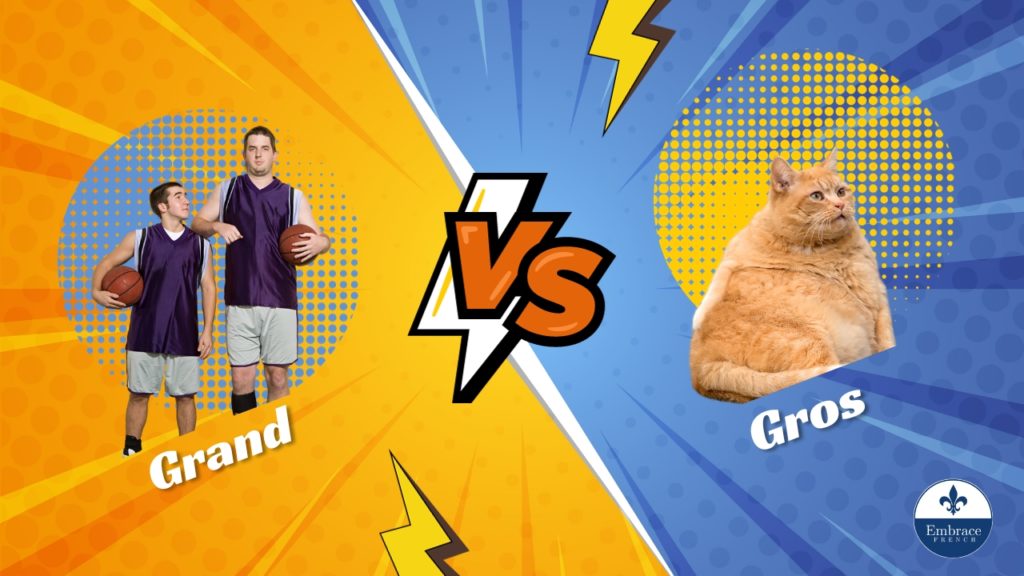The difference between “gros” and “grand”
CHALLENGE #13

The meanings of the words « gros » and « grand » are very similar, which is why, in English, they are often translated by the same word, « big ». However, in French, although they are similar, « gros » and « grand » are rarely interchangeable and are each used in very specific situations.
If I had to sum up their differences in a single sentence, I would say that « gros » = « big-large » and « grand » = « big-tall ».
But as you might expect, in reality, things are slightly more complex.
All the variations of « gros » and « grand »
Before discovering in which situations we should use these two words, I invite you to discover all the various forms in which you can find them.
As you probably know, in French, adjectives agree in gender and number (masculine/feminine + singular/plural). So here are all the variants of the words « gros » and « grand ».
Variations of “gros”
Gros = masculine singular
Grosse = feminine singular
Gros = masculine plural
Grosses = feminine plural
Variations of “grand”
Grand = masculine singular
Grande = feminine singular
Grands = masculine plural
Grandes = feminine plural
When to use “gros”
As mentioned earlier in this article, the word « gros » can be translated as « big », but to describe something with emphasis on its volume, importance or thickness.
To mark the importance or intensity of something
As if this thing was taking all the space in your life
- J’ai fait une si grosse erreur que j’ai peur de perdre mon travail. (I’ve made such a big mistake that I’m afraid of losing my job.)
- Mon frère a acheté une maison qui a besoin de grosses rénovations! (My brother bought a house that needs major renovations!)
Money can also be included in this category.
- J’ai gagné le gros lot. (I’ve won the jackpot.)
- Mon ami me doit une grosse somme d’argent. (My friend owes me a large amount of money.)
To describe one’s physical mass
- Mon chien est tellement gros qu’il a de la difficulté à courir. (My dog is so fat he has trouble running.)
- Je n’ai jamais été aussi grosse que lorsque j’étais enceinte. (I’ve never been as big as when I was pregnant.)
Volume
- Je voyage avec une grosse valise. (I travel with a big suitcase.)
- Elle n’avait jamais vu d’aussi grosses fraises! (She had never seen such big strawberries!)
When to use “grand”
When we use the adjective « grand « , we are usually talking about height, or greatness. That’s why it translates as « big – tall ». So we use « grand » to emphasize age, vertical dimension, intensity of value, etc.
Height or length
- L’Amazone est un grand fleuve qui traverse plusieurs pays. (The Amazon is a large river that flows through several countries.)
- Je suis plus grand que toi, je mesure 10 cm de plus que toi. (I’m taller than you, I’m 10 cm taller than you.)
Age
Here, no matter how tall people actually are, if they are older, they are said to be “plus grands” (taller). So we don’t say « je suis plus vieux” (I’m older), but rather, “je suis plus grand” (I’m taller).
- J’ai un petit frère et une grande sœur. (I have a little brother and an older sister.)
- Quand il sera grand, il veut être astronaute. (When he grows up, he wants to be an astronaut.)
Quantity: opulence, abundance and wealth
- Nous aimons tellement ces biscuits que nous les achetons toujours en grande quantité. (We love these cookies so much that we always buy them in large quantities.)
- Ils sont les héritiers d’une grande fortune familiale. (They are the heirs to a great family fortune.)
Area
- Vous avez la plus grande piscine du quartier. (You have the biggest pool in the neighborhood.)
- Votre table n’est pas assez grande pour asseoir 10 personnes. (Your table isn’t big enough to seat 10 people.)
Honor and significance
- Ce serait un rêve de rencontrer cette grande femme: elle a tellement fait pour notre pays! (It would be a dream to meet this great woman: she has done so much for our country!)
- Ce grand réalisateur méritait amplement le prix qu’il a reçu. (This great director fully deserves the award he received.)
Why does the use of « gros » or « grand » change the meaning of the sentence?
As we’ve just seen, « grand » and « gros » have different meanings. So I wanted to give you a few examples to show you how using either of these adjectives can change the meaning of your sentence, in spite of yourself.
Gros vs grand for a person
Pour mon cours de français, on vient de me confirmer que j’ai ce ____ homme comme professeur. (For my French class, I’ve just been confirmed to have this ____ man as my teacher.)
- … ce grand homme = an exceptional man
- … ce gros homme = an overweight man
Gros vs grand for a day
Je dois me coucher tôt, je veux être prêt pour ma _____ journée demain! (I have to go to bed early, I want to be ready for my _____ day tomorrow!)
- … pour ma grande journée = an important, landmark day
- … pour ma grosse journée = a busy, hectic or difficult day
Gros vs grand for a building
Nous avons réservé une chambre dans ce ___ hôtel. (We have booked a room at this ___ hotel.)
- … dans ce grand hôtel = a renowned, luxurious hotel
- … dans ce gros hôtel = a vast hotel, with many rooms and floors
Your challenge: choose between « gros » and « grand »
This time, your challenge is double! First, you have to choose between « gros » and « grand » for each of the sentences below. Then, you have to decide whether your choice should be masculine, feminine, singular or plural.
You’ll find the answers on our Facebook page.
If you need help understanding the meaning of these phrases, you can click here to see their meaning on Deepl.
- Maintenant que nous sommes adultes, mon petit frère est plus ____ que moi d’au moins 30 centimètres.
- Le vétérinaire m’a dit que mon chat était trop ____ et qu’il doit manger moins tous les jours.
- Nous adorons notre nouvelle maison, avec toutes ces ____ fenêtres, la maison est toujours très lumineuse.
- Wow! As-tu vu cette _____ rivière, elle fait plus de 200 km.
- Pour le cours de littérature, nous devons lire trois _____ livres. Ils ont au moins 400 pages chacun.
- Mardi prochain sera une ___ journée pour moi: dès 6h et jusqu’à 22h j’aurai des choses à faire.
- Notre classe a rencontré ce conférencier très célèbre et j’étais un peu nerveux de faire la connaissance de ce ____ homme.
- Il ne fait aucun doute qu’avec tous les VUS sur la route, les voitures en Amérique sont plus _____ que celles en Europe.
- Quand j’étais petite, je n’aimais pas prendre des marches avec mes parents car ils faisaient de bien plus _____ pas que moi!
- Cet agriculteur a gagné le prix de la plus ____ citrouille.
Have you downloaded your free guidebook package?

You can now download a free learning package on the 20 most commonly used verbs in French, conjugated in the present tense. This set includes an ebook with all the verbs and a sentence for each person (je, tu, il, elle, nous, vous, ils, elles), an Excel file to add all the concepts from the ebook to your flashcards application and a video where you can hear me pronounce these verbs and sentences. And it’s free! Download it now!



1 commentaire
Robert Horn · 16 janvier 2024 à 20h49
I really liked this example. It helps make things clear:
… dans ce grand hôtel = a renowned, luxurious hotel
… dans ce gros hôtel = a vast hotel, with many rooms and floors
Les commentaires sont fermés.